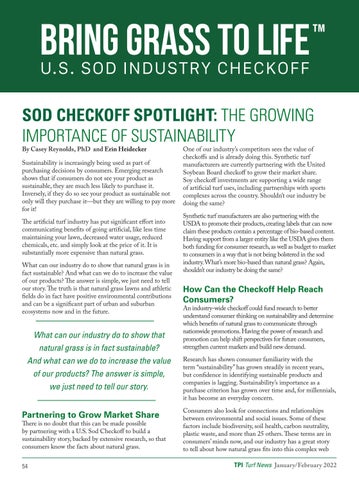SOD CHECKOFF SPOTLIGHT: THE GROWING IMPORTANCE OF SUSTAINABILITY By Casey Reynolds, PhD and Erin Heidecker
Sustainability is increasingly being used as part of purchasing decisions by consumers. Emerging research shows that if consumers do not see your product as sustainable, they are much less likely to purchase it. Inversely, if they do so see your product as sustainable not only will they purchase it—but they are willing to pay more for it! The artificial turf industry has put significant effort into communicating benefits of going artificial, like less time maintaining your lawn, decreased water usage, reduced chemicals, etc. and simply look at the price of it. It is substantially more expensive than natural grass. What can our industry do to show that natural grass is in fact sustainable? And what can we do to increase the value of our products? The answer is simple, we just need to tell our story. The truth is that natural grass lawns and athletic fields do in fact have positive environmental contributions and can be a significant part of urban and suburban ecosystems now and in the future.
What can our industry do to show that natural grass is in fact sustainable? And what can we do to increase the value of our products? The answer is simple, we just need to tell our story. Partnering to Grow Market Share There is no doubt that this can be made possible by partnering with a U.S. Sod Checkoff to build a sustainability story, backed by extensive research, so that consumers know the facts about natural grass. 54
One of our industry’s competitors sees the value of checkoffs and is already doing this. Synthetic turf manufacturers are currently partnering with the United Soybean Board checkoff to grow their market share. Soy checkoff investments are supporting a wide range of artificial turf uses, including partnerships with sports complexes across the country. Shouldn’t our industry be doing the same? Synthetic turf manufacturers are also partnering with the USDA to promote their products, creating labels that can now claim these products contain a percentage of bio-based content. Having support from a larger entity like the USDA gives them both funding for consumer research, as well as budget to market to consumers in a way that is not being bolstered in the sod industry. What’s more bio-based than natural grass? Again, shouldn’t our industry be doing the same?
How Can the Checkoff Help Reach Consumers? An industry-wide checkoff could fund research to better understand consumer thinking on sustainability and determine which benefits of natural grass to communicate through nationwide promotions. Having the power of research and promotion can help shift perspectives for future consumers, strengthen current markets and build new demand. Research has shown consumer familiarity with the term “sustainability” has grown steadily in recent years, but confidence in identifying sustainable products and companies is lagging. Sustainability’s importance as a purchase criterion has grown over time and, for millennials, it has become an everyday concern. Consumers also look for connections and relationships between environmental and social issues. Some of these factors include biodiversity, soil health, carbon neutrality, plastic waste, and more than 25 others. These terms are in consumers’ minds now, and our industry has a great story to tell about how natural grass fits into this complex web TPI Turf News January/February 2022










